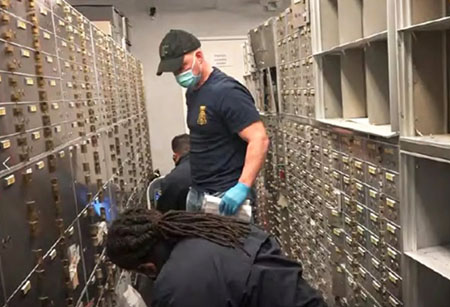by WorldTribune Staff, January 26, 2024
The 9th Circuit Court of Appeals ruled on Jan. 23 that the FBI violated the U.S. Constitution when in March of 2021 it seized the contents of 1,400 safe deposit boxes from U.S. Private Vaults in Beverly Hills, which was accused of money laundering.
Based on its belief that criminals were using the service, agents raided U.S. Private Vaults, a business that allowed people to rent safe deposit boxes anonymously. The search warrant stated that agents could only open the boxes to inventory their contents and identify the owners for the return of their property.

The FBI brought in drug-sniffing dogs and planned to set aside cash worth more than $5,000, with the intent to seize the money.
When individuals who rented boxes at the Beverly Hills facility asked the FBI for their belongings back, the bureau refused, saying it was going to file for forfeiture or transfer ownership to the government. The renters of the boxes then sued.
A U.S. district judge previously ruled in favor of the government, finding the search was covered by what’s known as an inventory exception to the requirement for a warrant in the U.S. Constitution’s Fourth Amendment.
Related: FBI confiscated property from hundreds of safety deposit boxes of people not accused of crimes, January 8, 2024
The appeals court ruled that exception does not apply to the raid on U.S. Private Vaults.
The ruling hinged largely on how the exception requires searches to operate on standardized instructions and highlighted how the FBI, in the Beverly Hills raid, used supplemental, customized instructions.
“Once the government begins adding a set of ‘customized’ instructions to a ’standardized‘ inventory policy — particularly the type of custom instructions presented by this case — the entire search stops being conducted pursuant to a ’standardized’ policy,” U.S. Circuit Judge Milan D. Smith Jr. wrote in the ruling.
“What you’ve got is a declaration or an understanding that from the beginning, the authorities intended to search all the boxes, all of them,” Judge Smith said. “There was not probable cause available with respect to all of the boxes, but they did it anyway. Now, how do we distinguish that from what the colonists were upset about, and which led to the Fourth Amendment?”
The ruling remanded the case back to U.S. District Judge Robert Klausner, who previously dismissed the case, for a ruling that directs the FBI to destroy records the bureau collected on the box renters who are members of the class-action case.
The opinion “draws a line in the sand, to ensure something like this never happens again,” Rob Johnson, a senior attorney with the Institute for Justice, which was representing the plaintiffs, said in a statement. “If this had come out the other way, the government could have exported this raid as a model across the country. Now, the government is on notice its actions violated the Fourth Amendment.”
“This is a good day for our country and the principle that the government’s power to search our property has limits,” added Jennifer Snitko, who was among the box renters.
Quality Resource for Citizen Journalists
